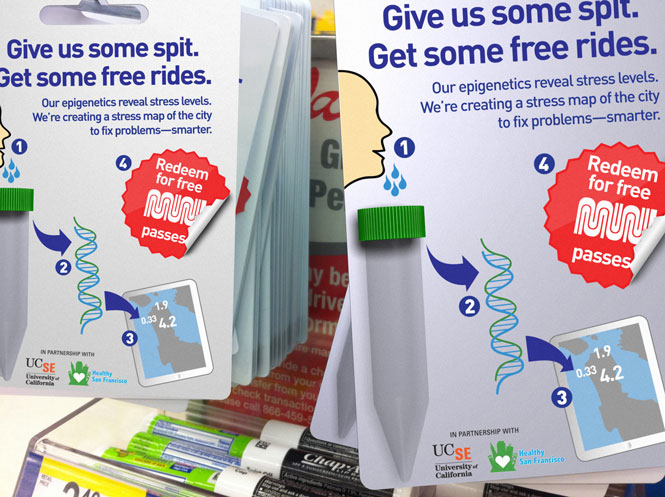Future Now
The IFTF Blog
A free ride for public health?
How can cities incentivize residents to collaborate on advancing public health initiatives? Tackling the future’s biggest public health challenges will depend on individuals pitching in - from increasing their physical activity to donating their genetic, environmental, or lifestyle data – and traditional health authorities will need to seek creative partnerships across industries to make the biggest impact.
Earlier this week we revealed an Artifact from the Future we created in 2010 – a snapshot of what might emerge if forecasts about the future materialize. In this scenario, people could contribute a spit sample that, through epigenetics, would reveal stress levels and build a stress map of San Francisco. That vile of spit gets you some free bus passes.
“This initiative represents a step towards a truly therapeutic city. This partnership acknowledges that stress impacts not only our individual bodies, but our collective bodies as communities who share surroundings, creating impacts that will echo through generations. It also fits in with a re-imagining of public health: with more multi-sector collaboration, crowd- sourced participation in research, and individual ownership and donation of data.”

It turns out that in Russia you can already get free subway rides in exchange for doing something healthy. Last November, as a promotion for the Winter Olympics in Sochi, passengers at the Vystavochnaya station, west of Moscow, could do 30 squats for a free ride on the subway.
“We wanted to show that the Olympic Games is not just an international competition that people watch on TV, but that it is also about getting everyone involved in a sporting lifestyle,” Alexander Zhukov, president of the Russian Olympic Committee, told Russian news agency RIA Novosti.
People took notice of this as a “genius way of dealing with the obesity epidemic” by creating “tangible and immediate incentives for working out.” The financial value of a bus ride, however, is small (93 cents for the Russian subway.) We also know that the best way to create sustained behavior change is not through extrinsic motivation. So there is something else happening here which gets at the core of Zhukov’s message: health cannot be a spectator sport.
There is a need to design systems that bring awareness to the health implications of everyday actions. This provides a critical feedback loop that shows how contributing health data, or choosing the healthier option, can lead to a healthier community.
Our ability to quantify everything in and around us is only going to grow over the next decade. People are already coming up with ways to merge our myriad data streams – from social media activity to heart rate and breathing – and create new layer of transparency that enables more personalized interventions for health and well-being. But let’s not design these systems to be passive. This is a great opportunity for cities to engage with their residents and let them opt in and really understand how their own health is intricately tied to the health of people and places around them.



